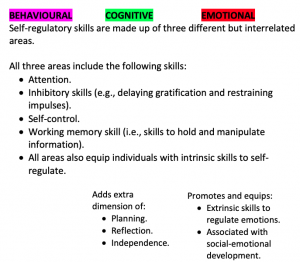Link Between Self-Regulation Skills, Mental Health & Early Academic Skills
WHAT IS SOCIAL-EMOTIONAL DEVELOPMENT AND SELF-REGULATION?
Social-emotional development refers to children’s emerging capacity to experience, regulate and express a range of emotions; develop close, satisfying relationships with other children and adults; and to actively explore their environment and learn.
Self-regulation is a child’s ability to understand what is happening around them and manage their social interactions, behaviour and emotional reactions.
Also referred to as self-regulatory skills, self-reg is made up three different but interrelated areas: behavioural, cognitive (or executive function) and emotional.

LINK BETWEEN SELF-REGULATION SKILLS AND DEVELOPMENTAL SKILLS
Self-reg skills are an important developmental skill that has an accumulating influence and effect on various areas of children’s development, including their self-esteem and self-worth, which builds their social-emotional wellbeing and self-identity. This links to ACTivatingVoices’ mission.
LINK BETWEEN SOCIAL-EMOTIONAL DEVELOPMENT, SELF-REGULATION SKILLS & EARLY ACADEMIC SKILLS
With the dramatic shift on the emphasis of social-emotional health and wellbeing, there has been an informed awareness of the link between social-emotional development and self-reg skills (which encompasses behavioural, cognitive/executive functioning and emotional self-reg skills). With this link there have been major findings about the impact of teachers on developing higher self-reg which has positive affects on school readiness and early academic achievement.
Firstly, some studies found that higher teacher-child relationships were correlated with higher self-reg, as well as with higher maths skills in both preschool and kindergarten.
-
-
- This was because the skills that enabled children to excel in understanding and solving maths problems (i.e., skills related to the learning of maths) such as working memory, inhibitory skills, and cognitive flexibility were the same skills associated with developing behavioural and cognitive self-reg.
-
In a second study, there were significant findings in relation to the impact of teacher-child relationships and behavioural reg on the effects of language development, specifically grammar skills.
In this study, they found that despite having high teacher-child conflict, a child’s grammar skills still increased. However, it was their level of behavioural reg skills that related to the amount of grammar gained.
-
-
- That is, more controlled behavioural reg correlated with higher grammar skills.
- While lower behavioural reg correlated with lower grammar gain.
- On the other hand, children with a weak (versus low) behavioural reg had further risk for delay in language development. This was because teacher-child relationships that were characterised as having high-conflict, compounded experiences for children that impacted more areas of language development in addition to their grammar skills.
-
In a third study, it was found active play improved the self-regulatory skills of children. It particular, there was a link between more active play and better self-reg.
-
-
- Children also showed higher literacy and maths skills, which was an indirect effect of using their self-reg processing skills obtained through the medium of active play.
-

To find out more, read the article, “What are self-regulation skills”.
CONCLUSION…
Skills that assist in school readiness and academic achievement such as, working memory, planning, and independence are the same skills required to develop self-regulatory processes (namely behavioural and cognitive self-reg).
WHEN IS THE BEST TIME TO START?
Now, this is research focused on the teacher-child relationship. How much more significant can the changes and results be in your child life when their relationship is with their first and most important person, you – their parent or carer – the most influential person in their lives.
HOW?
What is one way you can help your child’s mental health? The key term is helping them build their self-regulation, in particular their emotional self-regulation.
Self-regulation is a child’s ability to understand what is happening around them and manage their social interactions, behaviour and emotional reactions.
~ When children have higher emotional self-regulatory skills, this allows them to understand societal rules and behaviour, which leads them to monitoring their own actions.
This takes children to the level of internalising their self-regulation, which is what we want for all children’s self-regulation skills to reach.
However, before reaching the point they can internalise their self-regulation, children are externally regulating their emotions.
This means they need adult support to help them to self-regulate.
You can facilitate this area of development through various means such as empowering them withe a ‘voice’.
But how?
-
-
- Through engaging with them in conversational talk. That is, actual talking
- Giving them independence.
- Giving them self-agency
- Through engaging with them in conversational talk. That is, actual talking
-
By empowering children with their ‘voice’ through facilitating conversational talk opportunities, this stimulates their growth of self-regulatory skills. It also supports their literacy and language development, among other developmental areas.
To find out more, read “Why talk? – How you can improve self-regulation skills”..

